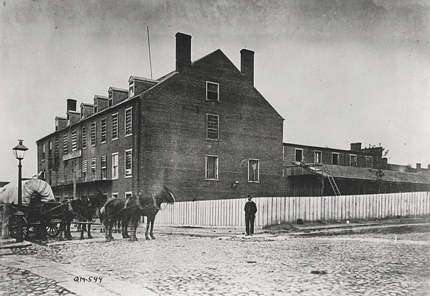Martial law in Richmond
In the first week of March 1862, only days after Jefferson Davis gave a speech condemning Lincoln for imprisoning suspected Confederates, dozens of Union sympathizers in Richmond were arrested and imprisoned without due process.

It was 3:00am on a Sunday when Confederate soldiers and detectives arrived at the country residence of Frank Stearns, about three miles outside of Richmond on the banks of the James River. Stearns, a wealthy distiller of Northern birth, was taken into custody and arrested for being “in communication with the enemy” and sympathetic to the Union cause. Upon his capture, Stearns said to one of the officers “I suppose you take me because I am a Union man.” The officer responded saying that they intended to do the same to other Union sympathizers in the city. Stearns replied simply, “Well, you’ll have your hands full.”
Stearns was not the only one arrested that night. In the first few days of March, dozens of suspected Union sympathizers in Richmond were arrested and imprisoned without due process.
Only five days prior to Stearns’ arrest, Jefferson Davis gave a rousing inaugural speech where he railed against Lincoln and the Union for their practice of imprisoning suspected Confederates. He spoke of “bastiles filled with prisoners, arrested without civil process or indictment duly found; the writ of habeas corpus suspended by Executive mandate” and decried the “barbarity of the Northern States” and the “disregard they have recently exhibited for the time-honored bulwarks of civil and religious liberty.”
Even by today’s political standards, where we see politicians “flip flop” on the issues, this was something altogether different. Davis went from boasting about the civil and religious liberties of the Confederacy to martial law in only a matter of days:
Five days after he spoke, a bill was rammed through both houses of the new Confederate Congress, allowing the president to suspend the writ of habeas corpus. Davis signed it and quickly placed Norfolk and Portsmouth under martial law. Two days later he issued the same order covering Richmond and ten miles beyond, effective at midnight of March 1, 1862. General Winder, named provost marshal, was charged with enforcing the edict in Richmond and Henrico County. Before dawn his men started their roundup of citizens suspected of disloyalty. Ashes of Glory, Ernest B. Ferguson p. 113
With dozens of Richmond citizens with suspect loyalties now in jail, the government took another step to keep control of Richmond: banning the production and sale of all alcohol. In the words of Davis’ general order:
All distillation of spiritous liquors is positively prohibited, and the distilleries will be forthwith closed. The sale of spiritous liquors of any kind is also prohibited, and establishments for the sale thereof will be closed. Richmond Whig, 3/3/1862
While the order reduced the number of drunks on the streets of Richmond and curtailed the open sale of alcohol in the city, the taverns and bars of Richmond quickly found ways to work around the new restrictions. Much like the Prohibition era a few decades later, they simply found better ways to hide their activities. For Richmonders of means, obtaining alcohol wasn’t much more difficult, just something now done behind closed doors.
The effects of martial law in Richmond would be felt for the rest of the war. Union spies who operated in Richmond would have to work harder to conceal their efforts. Citizens would have to think twice before speaking their mind about the state of the war. For Richmond specifically, the government felt it was a necessary evil–a precaution taken in the face of an approaching enemy. The cold winter that kept the Union troops at bay was beginning to thaw, and Richmond would soon find the war right at its doorstep only a few weeks later.
-
Recommend this
on Facebook -

Report an error
-

Subscribe to our
Weekly Digest




There are 3 reader comments. Read them.